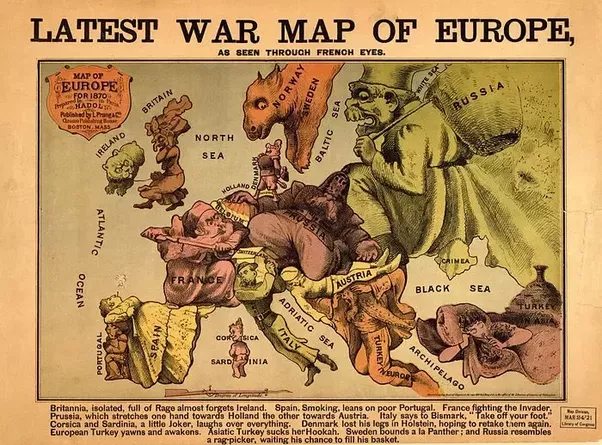The Modern Origins of Economic Nationalism
Nationalism is an ideology, and every ideology has a history and theory. It has a vision of a hell to avoid, a heaven to realize, and a proposed method for getting from here to there. We saw this on display in Trump’s first state of the union. After a long period of floundering around for a consistent theme of his presidency, nationalism has emerged as the central philosophical core. Mind you, not freedom; not the Constitution; not human rights. “The nation-state remains the true foundation for happiness and harmony,” said Trump in a speech in April 2016. It turns out that he truly believes this.
This ideology’s hell is one in which alien forces without and within rob us of our dreams of building a great country together. The vision of heaven is of perfect unity of purpose (and this unity can take a variety of forms). And the method for getting from here to there is strong and inspiring leadership that heads a heroic public sector of dedicated servants of the nation. An essential component of this ideology is economic, which is why nationalism is inseparable from protectionism, migration restrictions, and public works expenditures.
Nationalism emerged in the 19th century as an alternative to economic liberalism of the classical variety. Liberalism was embodied in the works of Adam Smith, J.B. Say, Thomas Jefferson, and A.RJ. Turgot. Smith summed up the creed: “What is prudence in the conduct of every private family can scarce be folly in that of a great kingdom.” In other words, there is no conflict of interests between the individual and the community, the community and the nation, and the nation and the rest of the world. That core ideal was on the ascendancy throughout the development from the end of the 18th century for another fifty years following.
But by mid-century, new competitors for ideological preeminence began to appear. One was socialism, with Karl Marx becoming its most prominent voice. Another was nationalism, and the voice here was Friedrich List (1789-1846). He taught in Germany and America, and exercised his most powerful influence through his 1841 book, The National System of Political Economy. This book was as aggressive an attack on the liberalism of Adam Smith as anything written by Karl Marx. It was not exactly anti-capitalist, but it regarded capitalism as valuable only insofar as it served to build the nation state.
“The unity of the nation forms the fundamental condition of lasting national prosperity,” List argued. That necessarily rules out Enlightenment ideas of individualism. “Only where the interest of individuals has been subordinated to those of the nation, and where successive generations have striven for one and the same object, the nations have been brought to harmonious development of their productive powers.” He argued further that only the “law of union of powers” can realize benefits to the industry of nations.
As with Marx’s book Capital, I seriously doubt that many of List’s contemporaries slogged through the long treatise to test his arguments against logic. What they took away mattered more: Adam Smith was wrong! Instead of free trade and freedom of migration, we should have a system of national tariffs and other import restrictions, subsidies for industry, and strict border controls for people and goods. The crucial point was the rejection of the very idea of freedom that had given birth to the modern world and its replacement by a new idea of national management of economic life. This was the legacy of Friedrich List.
To be sure, List’s ideas combined nicely with other intellectual trends of his time. Thomas Carlyle in the UK had rhapsodically celebrated the “great men” of the past that he believed were never going to emerge under Adam Smith’s system of natural liberty (he also did his best to shore up the moral status of slavery). There were the works of John Ruskin (1819-1900) who condemned consumer culture for robbing civilization of high art and skilled craft. Adding teeth to the anti-liberal cause was scientific racism, which grew over time to become a full eugenics movement, as I explain in my new book, which became the basis of new restrictions on migration and even the movement of peoples within a nation.
List himself claimed to be the successor to the economic views of Alexander Hamilton, fulfilled in the “American System” of Henry Clay.
As the growth of this other threat to liberty barrelled toward the 20th century, there also remained the question that survives to this day: how precisely are we going to define the nation? There seem to be five kinds of possible unity: race, language, religion, unity, and dynasty (ruling families). Which will it be? If you want to understand the confusion within the Trump movement, observe how the new nationalism is constantly toggling between these various forms of national identity.
The larger question is the one rarely asked among the defenders of Smith-style freedom. What is the liberal view of nationhood? Ludwig von Mises in 1944 attempted to offer one, drawing on the work of the French history Ernst Renan (1823-1892). The idea of national belongingness resides within the individual human heart, he wrote. It is up to all of us as individuals to decide what we want to be the locus of our attachments beyond ourselves and our families.
This obviously not the nationalism of Donald Trump. In fact, his nationalism is a strange animal. It is not really based in pro-government ambitions. He adores the first responders, police, and other security officials and celebrates them constantly. But all reports suggest he has no regard for the bureaucracies, public sector unions, regulators, or much of the apparatus of what is called the deep state. His nationalism seems based in personal loyalty rather than attachments to the state as such. It’s as if he believes in a personal state rather than a traditional nation state.
Nationalism as an ideology is new to this generation. We need to realize that even in Trump’s version, it is a coercive system that, at its worst, treats citizens as captive soldiers. The tragedy is that most forms of nationalism (everything but the Mises-Renan view) threatens to undermine every good that has come from liberal reforms like deregulation and tax cuts. National unity is not the answer; the freedoms we love emerged from rivalry among institutions, as well as tolerance toward every form of expression of personal loyalty.












